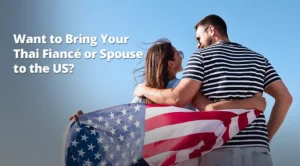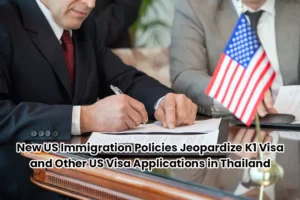For many Thai citizens, traveling to the United States is an exciting opportunity for new experiences, be it for tourism, work, study, or joining family members residing there. The US Visa for Thai Citizens offers a range of visa categories, each geared towards the applicant’s needs. Therefore, it’s very important that you understand what each visa type is for, and its application process to have a successful outcome.
This article aims to help you with an overview of the various US visa types available to Thai citizens, along with insights into the application process, making the information accessible and easy to understand.
Whether you’re planning a short visit, a family reunion, or a long-term stay in the US, this article will provide you with the necessary information to begin your visa application process.
General Requirements for US Visa Applications
Applying for a US visa from Thailand involves a set of standard procedures and documentation. First and foremost, applicants must complete the Nonimmigrant Visa Electronic Application (DS-160) form. This online form is the starting point for most visa types and requires detailed personal and travel information.
After submitting the DS-160, the next step is scheduling an interview at the US Embassy or Consulate. This is an important stage where applicants present their case and answer questions about their travel plans and background. Applicants should be prepared, have the right documents, and be honest during this interview.
Documentation plays a key role in the application process. Generally, applicants must provide the following:
- A valid Thai passport.
- Recent photographs as per US visa specifications.
- A receipt proving payment of the application fee.
- A confirmation page of the DS-160 form.
Depending on the visa type, additional documents such as travel itineraries, invitation letters, proof of financial stability, and employment or school enrollment forms may be required.
Finally, applicants need to understand that the application process can vary slightly depending on the specific US visa category. Therefore, it is advised to check the requirements for the particular visa category you are applying for.
Tourist Visas – B-1/B-2
The B-1 and B-2 visas are for Thai citizens looking to visit the US temporarily for business (B-1) or tourism, holiday, or medical treatment (B-2). These visas are the most popular compared to the rest of the US visa options.
For the B-1 visa, applicants typically seek to engage in business activities such as attending conferences, settling estates, or negotiating contracts. On the other hand, the B-2 visa caters to those visiting the US for leisure, tourism, or medical reasons. This includes activities like sightseeing, visiting friends or relatives, or obtaining medical treatment.
The application process for B-1 and B-2 visas involves several key steps. Applicants must complete the DS-160 form, pay the visa application fee, and schedule an interview at the US Embassy or Consulate. During the interview, it’s crucial to demonstrate the purpose of the visit and the intent to return to Thailand after the trip.
Supporting documents can strengthen the application. These may include evidence of financial means to cover the trip, ties to Thailand that ensure the applicant’s return, and, if applicable, a letter from a US-based entity detailing the nature of the business visit.
Fiancé(e) Visa – (K-1)
The K-1 visa, often known as the fiancé(e) visa, is for Thai citizens engaged to US citizens, allowing them to travel to the US to get married. What makes it unique is the temporary status of a tourist visa and the permanent objective of a spouse visa.
To be eligible for a K-1 visa, the Thai applicant and their US fiancé(e) must have met in person within the last two years, unless meeting in person would violate strict and long-established customs, or would result in extreme hardship for the US citizen. They must also prove that their relationship is genuine and that they intend to marry within 90 days of the Thai citizen’s arrival in the US.
The application process involves submitting a petition (Form I-129F) to the United States Citizenship and Immigration Services (USCIS) by the US citizen fiancé(e). Once the petition is approved, the Thai applicant must complete the DS-160 form, pay the visa fee, and attend an interview at the US Embassy or Consulate in Thailand.
During the interview, you must provide evidence of the relationship, such as correspondence, photos together, and evidence of previous visits. The applicant must also pass medical examinations and provide police clearance certificates.
After entering the US on a K-1 visa, the couple must marry within 90 days, after which the Thai citizen can apply for an Adjustment of Status to become a lawful permanent resident. This visa is a major step for couples planning their life together in the US, and meticulous preparation can lead to a successful application.
Spouse Visas – K-3, CR-1, IR-1
Spouse visas, namely K-3, CR-1, and IR-1, are for Thai citizens married to US citizens, each serving a different purpose and timeline for residency in the US.
The K-3 visa is a non-immigrant visa that allows the Thai spouse to enter the US while their immigrant visa (CR-1 or IR-1) is being processed. This visa will benefit couples who want to reside together in the US as soon as possible. To apply, the US citizen spouse must first file Form I-130 (Petition for Alien Relative) and then Form I-129F (Petition for Alien Fiancé(e)).
CR-1 and IR-1 visas are immigrant visas for spouses of US citizens. The CR-1 visa is issued to couples married for less than two years and grants conditional permanent residency.
In contrast, the IR-1 visa is for those married for more than two years, offering immediate permanent residency upon entry to the US.
The application process for both visas begins with the US citizen filing Form I-130. Upon approval, the Thai spouse must complete the DS-260 form, attend a medical examination, and go through an interview at the US Embassy or Consulate.
Documentation such as marriage certificates, proof of a genuine marriage, financial stability, and the US citizen spouse’s ability to support the Thai spouse are important for these applications.
The choice between K-3, CR-1, and IR-1 visas depends on individual circumstances, such as the length of the marriage and how quickly the couple wishes to be united in the US. Each path offers a structured route for spouses to begin their life together in America.
Visas for Children of US Citizens (K-2, K-4)
K-2 and K-4 visas are designed for the children of Thai citizens who are engaged or married to US citizens, allowing these children to accompany or follow to join their parents in the United States.
The K-2 visa is applicable for the unmarried children under 21 years of age of a K-1 visa holder. To apply for a K-2 visa, the child must be named on the K-1 visa application of the Thai fiancé(e). After the marriage of the Thai parent to the US citizen, the child can apply for adjustment of status to a lawful permanent resident.
Similarly, the K-4 visa is for the unmarried children under 21 of a K-3 visa holder. The process mirrors that of the K-2 visa, where children must be included in the parent’s K-3 visa application. Once in the US, these children are also eligible to apply for a change in their immigration status.
In both cases, the application process involves filling out the DS-160 form, attending a visa interview, and providing necessary documentation. This includes birth certificates, consent from the non-traveling parent (if applicable), and medical examinations.
These visas are vital in maintaining family unity during the transition when a Thai parent is marrying or rejoining their American spouse. They guarantee that children are not separated during this major family shift, allowing them to accompany their parents to the US.
Permanent Residency Visas (CR-1, IR-1)
Permanent residency visas, specifically the CR-1 and IR-1 visas, are for Thai citizens married to US citizens who wish to become a United States resident.
The CR-1 (Conditional Resident) visa is for couples who have been married for less than two years. It grants the Thai spouse conditional permanent residency in the US for two years. Within the 90 days before this two-year period ends, the couple must apply to remove the conditions on the residence. This involves proving that the marriage was not entered into solely for immigration benefits.
On the other hand, the IR-1 (Immediate Relative) visa is for those married to US citizens for more than two years. This visa provides the Thai spouse with immediate permanent residency upon entry into the US, without the need to remove conditions.
The application process for both visas begins with the US citizen spouse filing Form I-130. Once this is approved, the Thai spouse completes the DS-260 form, undergoes a medical examination, and attends an interview at the US Embassy or Consulate in Thailand.
Important Documentation includes:
- Valid marriage certificate (added a bullet on this one)
- Proof of a bona fide marriage
- Financial support evidence.
Securing a CR-1 or IR-1 visa is a significant step towards building a life in the US. It allows Thai spouses to live, work, and study in the US, as well as to travel in and out of the country with fewer restrictions. For couples looking to establish their roots in the US, these visas provide a clear and secure path to permanent residency.
Factors Affecting Visa Approval
Securing a US visa involves more than just completing forms and submitting documents. There are several factors that can influence the approval of a visa application. Understanding these factors can help Thai applicants strengthen their applications and increase their chances of success.
Purpose of Travel
Applicants must clearly articulate the purpose of their visit and ensure it aligns with the visa category they are applying for. For instance, tourist visa applicants should demonstrate their travel plans, while fiancé(e) visa applicants need to provide evidence of their relationship and impending marriage.
Ties to Thailand
Demonstrating strong ties to Thailand is crucial. This includes employment, family, property, or other significant connections that indicate the applicant will return after their visit to the US.
Financial Stability
Applicants need to show they can financially support themselves during their stay in the US. This can be through personal funds, sponsorships, or invitations from friends or relatives in the US.
Previous Travel History
A clean travel history, particularly to the US or other countries with stringent visa policies, can positively impact an application. It shows the applicant respects immigration laws and visa conditions.
Honesty and Consistency
Providing accurate information and being consistent in responses during the visa interview are vital. Discrepancies or misleading information can lead to visa denials.
Criminal Record and Security
A clean criminal record is important. Applicants with a criminal background or a perceived security threat may face challenges in obtaining a visa.
Health Considerations
Certain health issues, especially those that pose a public health risk, can affect visa eligibility. Applicants undergo a medical examination as part of the process.
It’s important to prepare thoroughly and address these factors in the application and interview. While meeting these criteria does not guarantee visa approval, it significantly improves the chances of a positive outcome.
Contact Siam Legal
Securing a US visa as a Thai citizen requires preparation and a clear understanding of the visa requirements.
This guide has outlined the key steps and considerations for various visa types, from tourist and fiancé(e) visas to those for spouses and children. The application process demands attention to detail, accurate documentation, and an honest presentation of your case.
For personalized guidance and assistance in your visa application process, contact Siam Legal. Our expertise can help simplify this complex process, increasing your chances of a successful application.
Contact Siam Legal
 | Ken Graham US Immigration Attorney Partner, Siam Legal International |
 | Natdaphon Luengsawang Senior US Visa Consultant Siam Legal International |
LIVE SUPPORT
 CALLCall (702) 799 9719 |  CHATChat with our representative | |
| From US: Sunday – Friday 5:00 PM – 7:00 AM (New York time) 2:00 PM – 4:00 AM (Los Angeles time) From Thailand: Monday – Friday | ||








































